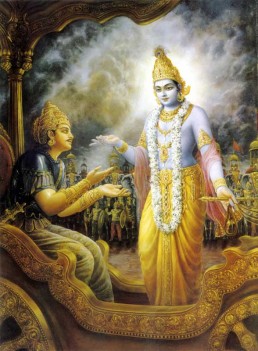Swami Chinmayananda Commentary
As a true soldier, Arjuna understands that there is an inner enemy called “desire,” which, like an efficient saboteur, undermines the wealth and security of his inner kingdom; and as a true prince, the royal demand of Arjuna is for immediate information as to the exact hide-out of this dangerous bandit. Krishna, as the spiritual teacher, has to indicate to his adventurous student where exactly the den of this devil is, from where he plans his nefarious activities. Indicating the secret fortresses of this inner enemy “desire,” the Lord says, “the senses, the mind, and the intellect are said to be itsseats of action.”
A true criminal, functioning as an efficient leader of a gang, operating in a large area, will generally have more places than one to function from. Three main offices, from where “desire,” in different forms, functions to destroy the peace and health of our inner life, have been indicated here very clearly.
The sense-organs, functioning without restraint in the world of sense-objects, are a very convenient theatre for “desire” to function in. When the external stimuli reach the mind through the sense-organs, the mind also becomes a breeding centre of sorrows created by “desire.” Lastly, the intellect, working and playing with the memories of the sense-enjoyments it had lived, and of the mental attachments it had entertained, becomes yet another safe den for “desire” to function from.
The deluded ego, foolishly identifying with the body, desires sense-enjoyments. Thoughtlessly identifying with the mind, it thirsts to experience more and more emotional satisfactions. And lastly, identifying with the intellect, it plans to re-live the remembered experiences of sense-enjoyments and mental-joys.
TO HUNT FOR “DESIRE” IN THESE THREE HIDE-OUTS IS TO COME, AT LAST, FACE TO FACE WITH IT. HOW FINALLY TO OVERCOME THIS INNER ENEMY IS DESCRIBED IN THE FOLLOWING STANZAS:
Adi Sankara Commentary
Indriyani, the organs; manah, mind; and buddhih, the intellect; ucyate, are said to be; asya, its, desire’s; adhisthanam, abode. Esah, this one, desire; vimohayati, diversely deludes; dehinam, the embodied being; avrtya, by veiling; jnanam, Knowledg; etaih, with the help of these, with the organs etc. which are its abodes. [The activities of the organs etc. are the media for the expression of desire. Desire covers the Knoweldge of the Self by stimulating these.]
The Bhagavad Gita with the commentary of Sri Sankaracharya – Translated by Alladi Mahadeva Sastry
Holy Geeta – Commentary by Swami Chinmayananda
The Bhagavad Gita by Eknath Easwaran – Best selling translation of the Bhagavad Gita
The Bhagavad Gita – Translation and Commentary by Swami Sivananda
Bhagavad Gita – Translation and Commentary by Bhaktivedanta Swami Prabupadha
Srimad Bhagavad Gita Chapter 3 – Verse 40 – 3.40 indriyani mano buddhir – All Bhagavad Gita (Geeta) Verses in Sanskrit, English, Transliteration, Word Meaning, Translation, Audio, Shankara Bhashya, Adi Sankaracharya Commentary and Links to Videos by Swami Chinmayananda and others – 3-40

